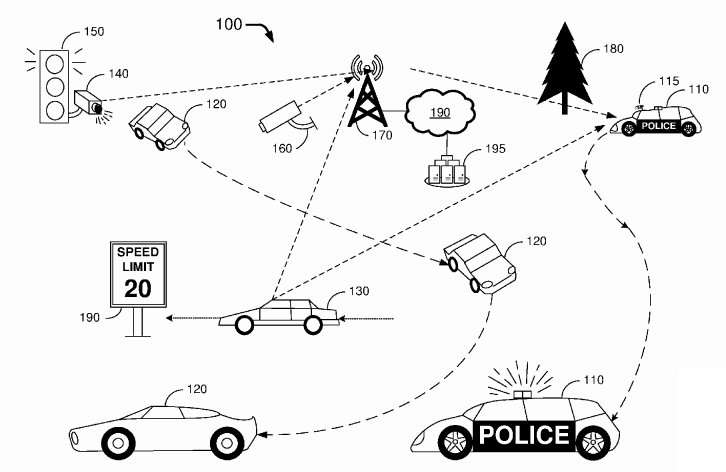January 27, 2018 weblog
Ford's patent application puts focus on autonomous police vehicles

Drivers thumbing their nose at speed limits may one day get a surprise when the police car springing out to nab them is driverless, if a concept from Ford were to be realized. The automaker filed for a patent for an autonomous police car.
The patent filing, spotted by Motor1.com , discussed a car that can spot infractions and act on them. Inventors were listed as Mohamed Ahmad and others. It was filed in July 2016.
The applicant for "Autonomous Police Vehicle" was listed as Ford Global Technologies.
Presenting the background on their idea, the patent stated, "While autonomous vehicles can and will be programmed to obey traffic laws, a human driver can override that programming to control and operate the vehicle at any time. When a vehicle is under the control of a human driver there is a possibility of violation of traffic laws. Thus, there will still be a need to police traffic."
How would driverless police cars know which drivers are breaking rules of the road TechCrunch: "Ford's patent filing describes a machine learning algorithm that would be able to determine whether or not a vehicle breaking the law warrants a warning as opposed to a citation, and relay that decision to the driver."
Reports about the filing on tech-watching sites said the vehicle would be equipped to detect speeding or could interact with stationary speed cameras. Sensors on the roadsides could assist the police.
The police vehicle could function in the place of human police or in addition to human police.
The patent discussion makes the observation that "Routine police tasks, such as issuing tickets for speeding or failure to stop at a stop sign, can be automated so that human police officers can perform tasks that cannot be automated."
The patent application in turn described autonomous police vehicles able to perform on behalf of human officers' tasks such as issuing tickets/citations to drivers who violate the traffic laws.
The autonomous police car would pursue a speeding vehicle and confirm a speeding violation, in which case the autonomous police car could wirelessly connect to the original car to communicate with the passenger, said TechCrunch, verify identity, and issue a citation.
Vaughn Highfield, Alphr, expanded on this scenario, where a police vehicle would interact with a car in question.
"In practice, Ford's car would establish a direct wireless connection with a speeding car and then send a message to its dashboard indicating that it's going too fast and has been spotted. The vehicle would then reply to Ford's police car informing it of if it was in autonomous mode or being driven by a human." An offending car's driver would share driving licence information and the police car would automatically file a ticket against the licence.
While not all tech observers loved the idea, the patent filing was not very surprising either. Jordan Crook, TechCrunch, said, "it's not outside the realm of possibility that patrol police fall victim to the age of automation."
Nonetheless, wrote Stephen Edelstein, The Drive: "The potential pitfalls of machines conducting police work have us feeling especially skeptical about this one."
More information: United States Application US20180018869 www.freepatentsonline.com/20180018869.pdf
© 2018 Tech Xplore


















